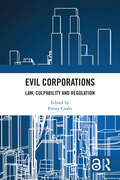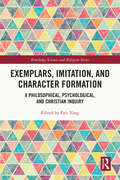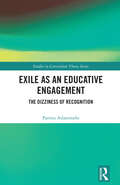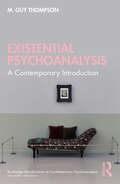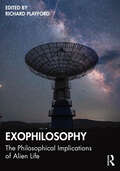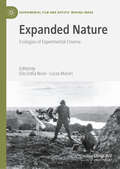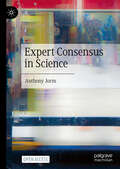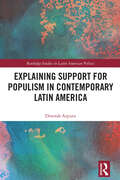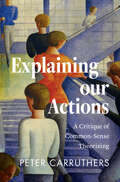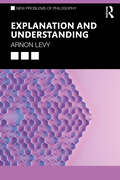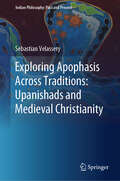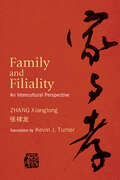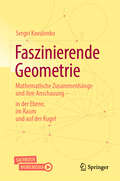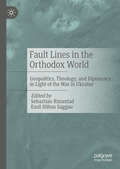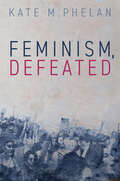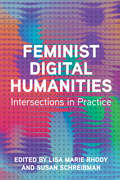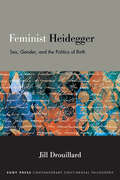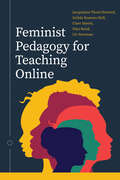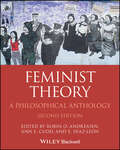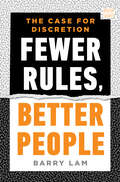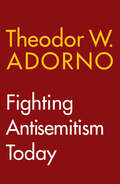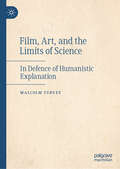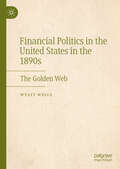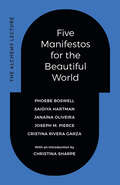- Table View
- List View
Evil Corporations: Law, Culpability and Regulation
by Penny CroftsThis book elaborates and interrogates the idea of evil corporations from a diverse range of disciplines.There has long been awareness of systemic harms inflicted by corporations, but this awareness has rarely led to any effective legal means to prevent and/or respond adequately to them. Lawyers and legal theorists appear to be stuck asking the same questions, and giving the same ineffective answers. Part of the problem, this book maintains, is the relative lack of theoretical interrogation into the nature of corporations as responsible, moral agents. To break this stasis, this book draws upon philosophies of wickedness in order to ask whether or not corporations are, or can be, evil. With contributions from a range of different disciplines, including law, cultural theory, theology, and philosophy, it offers a novel account of how and why corporate wrongs are caused, whilst exploring the extent to which the legal system itself facilitates such wrongdoing.The book targets a broad international audience with research interests in corporate crime. This will be of particular interest to those within the legal discipline, including corporate law, criminal law, corporate crime and law and humanities scholars.Chapter 9 of this book is freely available as a downloadable Open Access PDF at http://www.taylorfrancis.com under a Creative Commons Attribution-Non Commercial-NoDerivatives (CC-BY-NC-ND) 4.0 license.
Exemplars, Imitation, and Character Formation: A Philosophical, Psychological, and Christian Inquiry (Routledge Science and Religion Series)
by Eric YangThis volume examines the role and relevance of exemplars and the practice of imitation in character development and formation. While the role of exemplars and imitation in spiritual and moral formation has been an integral part of many religious and wisdom traditions, in recent times there has been limited theological and philosophical investigation into it and a dearth of interdisciplinary discussion. The book brings together relevant research and insights from leading experts within philosophy, psychology, and theology, with a slight emphasis on Christian approaches to exemplars and imitation, especially given the reflection on these themes throughout the history of the Christian intellectual and mystical tradition. Many of the contributions display an interdisciplinary approach into these issues; hence, this volume will be of interest to philosophers, psychologists, theologians, and others who work in moral psychology and character formation.
Exile as an Educative Engagement: The Dizziness of Recognition (Studies in Curriculum Theory Series)
by Parmis AslanimehrThis book explores the concept of exile, experienced not as a physical displacement but as a subjective experience of disconnection from the Other. It further clarifies the notion of exilic subjectivity, whereby a hidden facet of the self—ineffable both to the Other and to the Self—causes a distance between self-comprehension and external perception. In doing so, it poses a challenge to recognition theory’s assertion that self-understanding occurs through interactions with Others. Engaging with the writings of Georg Wilhelm Friedrich Hegel, Charles Taylor, Axel Honneth, Søren Kierkegaard, and Rumi, the book explores the difficulties individuals encounter when transitioning their inwardly focused private identities into public spaces, such as educational institutions. It emphasizes the critical role educators can play in cultivating an atmosphere of attentive listening attuned to the unique experiences that may exile the self. Through the complex interplay of writings by thinkers such as Hegel, Kierkegaard, Rumi, Taylor, and Pinar, this work transcends traditional theories of recognition. Rather than resolving misrecognition, it embraces it as a central aspect of the human condition, examining the tension between self-perception and external acknowledgement. The text phenomenologically investigates “seeing” the Other and the risk of misrecognizing an individual’s innermost depths. These insights find resonance in academia, where even amid success, a chasm may persist, isolating students and educators from each other. As the self dwells in the uneasiness of estrangement, the discussion welcomes the ownership of silence and inwardness into the classroom. From this detached perspective, the possibility of recognizing the convergence of familiarity and strangeness before and within oneself may emerge.This book is tailored for scholars, educators, and readers interested in the intersections of philosophy, education, and lived experience. It offers readers innovative approaches to understanding exile and recognition, fostering deeper engagement with the complexities of identity, alienation, and the self.
Existential Psychoanalysis: A Contemporary Introduction (Routledge Introductions to Contemporary Psychoanalysis)
by M. Guy ThompsonA fascinating introductory volume, Existential Psychoanalysis: A Contemporary Introduction integrates existential philosophy with psychoanalysis, drawing on key theorists from both areas and expertly guiding the reader on how to incorporate these two disciplines, which may appear disparate on the surface, into their clinical and theoretical work. This unique and accessible book sees M. Guy Thompson explore key concepts, such as experience, authenticity, freedom, psychic change, agency, and the pervasive role of suffering in our lives. Throughout, he draws on a wide range of thinkers from both fields, including Sartre, Heidegger, Nietzsche, Freud, Winnicott, Bion, Laing, and Lacan. Exquisitely lucid and engaging, Thompson deftly brings the reader into thoughtful and enlightening territory typically inaccessible to the general reader. Although existential philosophy and psychoanalysis are often thought of as incompatible fields, Thompson shows how they share far more in common than is usually supposed. This volume will help clinicians, scholars, and students of all persuasions learn how integrating the two disciplines introduces a more personal and revolutionary understanding of what psychoanalysis can be in the twenty-first century. This compelling assimilation of continental philosophy and psychoanalysis will be of interest to psychoanalytic practitioners and psychotherapists, as well as philosophers, social scientists and any student of the human condition.
Exophilosophy: The Philosophical Implications of Alien Life
by Richard PlayfordThis volume addresses philosophical questions raised by the possibility of alien life and extraterrestrial intelligence. The different philosophical perspectives and approaches presented across the chapters will provide a foundation for future work on exophilosophy.Interest in space, space exploration, and alien life has never been greater. In popular culture, for example, it has proven a persistent theme in science fiction films (e.g., Star Trek, Star Wars), books (e.g., H. G. Wells, Arthur C. Clarke, Ray Bradbury), and computer games (e.g., Sid Meier’s Alpha Centauri), as well as bestselling ‘non- fiction’ books (von Däniken’s multimillion-selling Chariots of the Gods?), and hit ‘documentary’ shows (e.g., Ancient Aliens). There has also been persistent interest in these topics amongst scientists with organizations such as NASA and SETI having an enormous impact on both the scientific and popular imagination. Yet, curiously, the topic has received relatively little philosophical attention. Whilst certain aspects of these topics remain within the proper purview of the sciences, a host of philosophical questions are raised by the possibility of alien life and extraterrestrial intelligences, and the possibility of our coming into contact with them. This collection of essays will examine some of these questions whilst laying the groundwork for future study in an as-yet under-researched area of philosophy.Exophilosophy is essential reading for scholars and students with an interest in space and philosophy, especially those working in philosophy of science, metaphysics, epistemology, ethics, philosophy of language, and philosophy of religion.
Expanded Nature: Écologies du cinéma expérimental (Experimental Film and Artists’ Moving Image)
by Elio Della Noce Lucas MurariThis book explores the emergence of ecological consciousness in the work of contemporary experimental filmmakers. If it can be said that experimental filmmakers are "expanding" the artistic field through an exploration of the potencies, modes of dissemination and performance of the moving image, in the Anthropocene these practices strive for another kind of expansion: to expand our experience of nature. Appending flowers to the film strip or burying it in the ground, inventing observational devices, allowing the camera to be affected by natural forces, engaging one's own filming body in a symbiotic relationship with the environment, reconstituting ecosystems at the moment of projection: the ecologies of experimental cinema presented in this book constitute forms of practice and engagement that awaken a heightened sensibility towards the living world through cooperative links, casting other beings as subjects and agents of filmic processes, and, finally, reshaping the economy of filmmaking. Thus, ecologies of perception, medium, production, and multinaturalism are deployed, contributing to the restoration of our sensory bond with the natural world. Several chapters were translated with the help of artificial intelligence. In each case, the text has subsequently been revised further by the author as well as the translator Charlie Hewison and a professional copy editor.
Expert Consensus in Science
by Anthony JormThis Open Access book shows how expert consensus pervades all areas of science. It explores, in particular, the role of consensus in establishing scientific truth, in guiding professional practice and policy and agreeing on what are acceptable scientific methodologies. For some scientific issues, a consensus forms spontaneously among scientists working on a topic, while for others, where the issues are complex, a formal deliberative consensus process is commonly needed. Deliberative consensus processes are becoming more important as scientists increasingly deal with complex multi-disciplinary issues of policy importance such as climate change due to human activity. While deliberative consensus processes are commonly used, they often lead to criticism from consensus skeptics. The book argues that deliberative consensus processes in science can be improved and proposes a number of realistic ways forward, ending with a discussion of whether communicating the scientific consensus on a topic is a good way to persuade the public.
Explaining Support for Populism in Contemporary Latin America (Routledge Studies in Latin American Politics)
by Dinorah AzpuruExplaining Support for Populism in Contemporary Latin America investigates the stronghold that populism exerts on citizens in the developing world. More specifically, relying on regional surveys, this book explores why many citizens consistently supported eight populist presidents who were elected in contemporary Latin America. It examines the determinants of support for the populist presidents who governed Venezuela, Ecuador, Bolivia and Nicaragua between 1999 and 2019, and the variables that explain support for the most recent populist presidents in Mexico, Brazil and El Salvador between 2018 and 2023. Unique to this approach is a strong emphasis on the demand-side of populism and the use of country-specific survey data across the years. This book explores the determinants of support for populist presidents in four dimensions: demographic variables, ideological and policy-preference variables, performance variables, and variables related to representative democracy. Understanding what drives people to support populist leaders is critical for revitalizing representative democracy in Latin America. Furthermore, insights about the factors that lead citizens to support populism in Latin America can also inform the analysis of support for populism in other parts of the world.
Explaining our Actions: A Critique of Common-Sense Theorizing
by Peter CarruthersWe often explain our actions and those of others using a commonsense framework of perceptions, beliefs, desires, emotions, decisions, and intentions. In his thoughtful new book, Peter Carruthers scrutinizes this everyday explanation for our actions, while also examining the explanatory framework through the lens of cutting-edge cognitive science. He shows that the 'standard model' of belief–desire psychology (developed, in fact, with scant regard for science) is only partly valid; that there are more types of action and action-explanation than the model allows; and that both ordinary folk and armchair philosophers are importantly mistaken about the types of mental state that the human mind contains. His book will be of great value to all those who rely in their work on assumptions drawn from commonsense psychology, whether in philosophy of mind, epistemology, moral psychology, ethics, or psychology itself. It will also be attractive to anyone with an interest in human motivation.
Explanation and Understanding (New Problems of Philosophy)
by Arnon LevyScience has multiple goals: to describe the world, as it is now; to predict the future and to make inferences about the past. Science also aims to understand the world – to explain why it is the way it is. But what does it take to explain a phenomenon? How does science generate understanding and what does that take?In this thorough and clearly written introduction to scientific explanation, Arnon Levy explores the following problems and questions: the background to the topic of scientific explanation, particularly the questions of what an explanation is, what makes a good explanation and why seek them in the first place empiricism about explanation: Hempel’s deductive-nomological model and its problems unificationism about explanation: must good scientific explanations fit into an overall ‘explanatory store’? causation and explanation: Lewis’s description-based model, Woodward’s interventionist view and Strevens’s criterion of selection theory connections between explanation and understanding models, idealization and explanation non-causal explanation and explanation in non-scientific contexts the nature of understanding. Additional features, such as chapter summaries, suggestions for further reading and a glossary, make this an excellent resource for students of philosophy of science, metaphysics and epistemology.
Exploring Apophasis Across Traditions: Upanishads and Medieval Christianity (Indian Philosophy: Past and Present)
by Sebastian VelasseryThis book delves into the ethics of apophasis across ancient Indian philosophy, pre-Socratic Greek thinkers, and early medieval Christianity. The chapters explore apophasis in the Upanishads, the Rig Veda, and Sankara’s Advaita Vedanta. The author also offers insights into the evolution of apophasis in the Western tradition, moving from Heraclitus and early Christianity to medieval Christianity. An insightful exploration provides a rich dialogue between traditions and makes it an interesting read for scholars and students worldwide in theology and philosophy.
Family and Filiality: An Intercultural Perspective (SUNY series, Translating China)
by Xianglong ZhangCompares Chinese and Western perspectives on the family.This book is a timely contribution to the growing field of the philosophy of the family. Drawing on a lifetime of research in Western and Chinese philosophy, Zhang Xianglong adopts a comparative perspective to navigate between Greek philosophy, phenomenology, and Confucianism to explore such topics as the nature of the family, filiality, human nature, temporality, memory, incest taboos, the future of Confucianism, and popular literature. He weaves his vast intercultural knowledge and understanding into penetrating philosophical, social, literary, and anthropological insights that reveal the strengths and weaknesses of Western and Chinese conceptions of the family. This book is a paradigm of comparative philosophy and demonstrates the value of the Chinese intellectual tradition for modern philosophy.
Faszinierende Geometrie: Mathematische Zusammenhänge und ihre Anschauung – in der Ebene, im Raum und auf der Kugel
by Sergei KovalenkoIn diesem Buch findest du eine detaillierte und zugleich sehr anschauliche Darstellung ausgewählter Inhalte aus der elementaren Geometrie, untermauert mit historischem Kontext und geschichtlichen Erzählungen. Neben den klassischen Sätzen und Ergebnissen der ebenen und räumlichen Geometrie und Trigonometrie werden auch speziellere Themen behandelt – etwa die sphärische Geometrie oder die theoretischen Grundlagen der Konstruktion geometrischer Objekte mit Hilfe von Lineal und Zirkel. Das Buch richtet sich an alle, die sich für Geometrie, ihre theoretischen Aspekte und deren Zusammenhänge sowie für ihre vielfältigen Anwendungen interessieren; es setzt nur mathematische Grundkenntnisse wie Term- und Äquivalenzumformungen voraus. Insbesondere Lehramtsstudierenden sowie Lehrerinnen und Lehrern kann es neue kreative Impulse zur Weitergabe an jüngere Generationen liefern.
Fault Lines in the Orthodox World: Geopolitics, Theology, and Diplomacy in Light of the War in Ukraine
by Sebastian Rimestad Emil Hilton SaggauThroughout the past years, the Orthodox world has seen numerous political and theological confrontations. New borders have been shaped by churches and states. This only increased in light of the Russian-backed conflict in Ukraine from 2014 and onwards, which has led to new theological lines of thinking, geopolitical confrontations, and an acute need for diplomatic handling of crisis. At the centre is the Russian Orthodox Church’s global role and its effects in Ukraine. The confrontations are born out of a complex entanglement of church politics, theological differences, legal tensions, national allegiances, and the very concrete political and military clashes between nation states. In light of the war in Ukraine, Global Orthodoxy has seen new fault lines in the making. This volume gathers chapters that shed light on these entanglements and their political, theological, and geopolitical consequences. The book is not limited to the Russian-Ukrainian conflict, but also includes papers focusing on other nations, churches, and aspects (theological, theoretical, geopolitical, empirical etc.).
Feminism, Defeated
by Kate M. PhelanFeminism has been defeated.Once a politics, feminism is now a philosophy, an epistemology, a method. Once for women, it is now for everyone. Once in pursuit of liberation, it now seeks only inclusion.In Feminism, Defeated, Kate Phelan traces the depoliticization and ultimately, the defeat of feminism. She recovers the second-wave view of men and women as sex-classes, enemies, political kinds, a view more radical than the contemporary view of men and women as social constructs. She also describes how poststructuralism displaced this view and replaced it with another. In this view, the sex/gender binary constructs men and women, and excludes the gender nonconforming.As this view replaced the second-wave one, the injustice of men’s oppression of women was replaced by that of exclusion, and the goal of women’s liberation was replaced by that of inclusion. Thus did feminism become the trans-inclusionary movement as which we now know it, and Phelan shows that this shift was not the progression of feminism; it was the betrayal of it. In this highly original and persuasive study, she argues that the recent emergence of a new gender-critical feminism presents a moment of opportunity to reclaim feminism’s political project.
Feminist Digital Humanities: Intersections in Practice (Topics in the Digital Humanities)
by Susan Brown Susan Schreibman Laura Mandell Jacqueline Wernimont Nanna Bonde Thylstrup Kristin Veel Daniela Agostinho Astrid Von Rosen Monika Barget Ravynn K. Stringfield Tanya E. Clement Jaime Lee Kirtz Nikki L. Stevens Jenny Bergenmar Cecilia Lindhé Katrine Dirckinck-Holmfeld Mark Sample Lisa Marie Rhody Dhanashree Thorat Andie SilvaFeminist digital humanities offers opportunities for exploring, exposing, and revaluing marginalized forms of knowledge and enacting new processes for creating meaning. Lisa Marie Rhody and Susan Schreibman present essays that explore digital humanities practice as rich terrain for feminist creativity and critique. The editors divide the works into three categories. In the first section, contributors offer readings that demonstrate how feminist thought can be put into operation through digital practice or via analytical approaches, methodologies, and interpretations. A second section structured around infrastructure considers how technologies of knowledge creation, publication, access, and sharing can be formed or reformed through feminist values. The final section focuses on pedagogies and proposes feminist strategies for preparing students to become critical and confident readers with and against technologies. Aimed at readers in and out of the classroom, Feminist Digital Humanities reveals the many ways scholars have pushed beyond critique to practice digital humanities in new ways. Contributors: Daniela Agostinho, Monika Barget, Jenny Bergenmar, Susan Brown, Tanya E Clement, Katrine Dirckinck-Holmfeld, Jaime Lee Kirtz, Cecilia Lindhé, Laura Mandell, Lisa Marie Rhody, Mark Sample, Susan Schreibman, Andie Silva, Nikki L. Stevens, Ravynn K. Stringfield, Dhanashree Thorat, Nanna Bonde Thylstrup, Kristin Veel, Astrid von Rosen, and Jacqueline Wernimont
Feminist Heidegger: Sex, Gender, and the Politics of Birth (SUNY series in Contemporary Continental Philosophy)
by Jill DrouillardA feminist reading of how Heidegger may have responded to an unanswered questioned he posed in 1923, "Problem: What is woman?" while using his thought to better understand how contemporary society replies to questions in the realms of law, bioethics, pedagogy, and politics.This book begins with an unexplored and unanswered question that Martin Heidegger raises in a 1923 Freiburg course: "Problem: What is woman?" Yet, why should we care that Heidegger raises this "problem"? What could he, a member of the National Socialist Party, help feminists understand about responding to "the woman question"? How can Heidegger help us understand our own historical climate in which this question continues to hold significance? Jill Drouillard divides Heidegger's thought into two categories to think about the sexed/gendered experiences that coordinate our birth: (1) the one that suspends "the woman question" and that provides useful resources for thinking the fluidity of sex/gender, and (2) the one that provides a totalized reply to this query by manipulating tropes of the feminine to advance a politico-poetic project of Nazi politics. She uses Heidegger as a cautionary tale to demonstrate the harm that occurs when society tries to define the being (or "what is") of woman in any definite sense. In some chapters, she teases apart how Heidegger may have offered a reply to "the woman question" and, in others, shows what happens in today's society when law, bioethics, politics, and pedagogy reckon with this query.
Feminist Pedagogy for Teaching Online
by Enilda Romero-Hall Jacquelyne Thoni Howard Clare Daniel Niya Bond Liv NewmanInstructors across higher education require inspiring and practical resources for creating, adapting to, and enhancing, online teaching and learning spaces. Faculty need to build collaborative, equitable and trusting online learning communities. This edited volume examines the experiences that interdisciplinary and global feminist educators have had—both their successes and their challenges—in infusing feminist pedagogical tenets into their online teaching and learning practices. Contributors consider how to promote connection, reflexivity, and embodiment; build equity, cooperation, and co-education; and create cultures of care in the online classroom. They also interrogate knowledge production, social inequality, and power. By (re)imagining feminist pedagogy as a much-needed tool and providing practical advice for using digital technology to enact these tenets in the classroom, this collection will empower educators and learners alike.
Feminist Theory: A Philosophical Anthology (Blackwell Philosophy Anthologies)
by Ann E. Cudd Robin O. Andreasen E. Díaz‐LeónBringing together influential voices and groundbreaking new essays, Feminist Theory: A Philosophical Anthology examines the key questions at the heart of feminist philosophy through a clear structure and accessible yet rigorous content. This carefully curated selection of classic and contemporary essays emphasizes the flourishing growth of feminist thought over time, ranging from foundational texts by Simone de Beauvoir, Judith Butler, and Kimberlé Crenshaw, to new essays by contemporary scholars like Kate Manne, Talia Mae Bettcher, and Robin Dembroff. This edition expands on the original with fresh scholarship and a broader range of perspectives on gender, identity, knowledge, production and justice. New essays address intersectionality, gender identity, the critique of ideal theory, feminist critiques of traditional ethics, the impact of social norms on autonomy and epistemic injustice, and much more. Including critiques of traditional philosophical frameworks and self-reflection of feminism itself, this essential collection highlights how feminist theory shapes and challenges our current understanding of society. Designed for students and scholars in philosophy, gender studies, and social theory, Feminist Theory: A Philosophical Anthology is ideal for students taking courses in feminist philosophy and feminist theory, educators in social sciences and humanities, and activists and professionals seeking a nuanced understanding of feminist philosophy.
Fewer Rules, Better People: The Case for Discretion (A Norton Short)
by Barry LamA philosopher argues that the proliferation of rules and mandates is making us dumber, less moral, more deceptive, and less able to govern important institutions. Wherever there’s a rule, there is someone with the power to apply or ignore it—or add to it, in the interest of justice. From enforcing chores to issuing life sentences, decision-makers deliver flawed and sometimes arbitrary outcomes. But is their use of discretion good or bad overall? As a society, should we seek to minimize or maximize discretion, with all its potential for bias and other kinds of human error? Reframing our understanding of justice and ethics, philosopher Barry Lam argues that while use of discretion—whether by a sports referee, a parent, a police officer, or a judge—can never be perfect, removing it has even more problematic effects. Mandatory arrests and sentencing laws have not eliminated bias, but have corrupted the courtroom, institutionalized lying, and brought about even more unjust and arbitrary results. Fewer Rules, Better People is a bold, riveting treatise that sheds new light on political debates about law and justice while aiming to prepare us for the imminent threat of more “perfect,” discretion-less rule enforcement by AI.
Fighting Antisemitism Today: A Lecture
by Theodor W. AdornoIn autumn 1962 Theodor W. Adorno gave a lecture on fighting antisemitism to the German Coordinating Council of Societies for Christian-Jewish Cooperation, a lecture that remains as topical and urgent today as it was in the 1960s. After the Second World War, Germany was grappling with a reluctance to admit collective guilt for the horrors of the Holocaust and German society was witnessing the emergence of various forms of hidden or ‘crypto’ antisemitism. In his lecture Adorno demonstrated that antisemitism is a central and essential element of right-wing extremism and is identical in structure to racism. It is accompanied by an authoritarian mindset and a conformist anti-intellectualism. Moreover, a classic trick used by anti-Semites is to protest against taboos which prevent them from freely spreading their hate by classing them as a form of persecution, and to present themselves as victims of it. The only antidote to this poison is an unwavering loyalty to the truth in dealing with historical and political realities. Adorno advocates an anti-authoritarian programme to prevent antisemitic character development and advises taking firm action against outbreaks of antisemitic behaviour. His brilliant analysis of the sources and dangers of antisemitism is as relevant now as it was sixty years ago.
Figurationen des Mangels in Ästhetik, Design- und Kunstpraktiken (Ästhetiken X.0 – Zeitgenössische Konturen ästhetischen Denkens)
by Oliver Ruf Luca ViglialoroDas Konzept ‚Mängelwesen‘ hat seine vielleicht bekannteste Formulierung auf dem Feld der Geisteswissenschaften durch die philosophische Reflexion von Arnold Gehlen gefunden. In seinem Buch Der Mensch. Seine Natur und seine Stellung in der Welt (1940) entwirft er die nicht unumstrittene These, dass der Mensch ein solches ‚Mängelwesen‘ sei, da er weder somatisch noch auf dem Feld der Instinkte eine adäquate Anpassung an die Welt aufweisen könne. Im Vergleich zu anderen Lebensformen und Spezies sei er zudem arm an Mitteln zur Befriedigung sinnlicher Bedürfnisse. Dies führt nach Gehlen dazu, dass der Mensch situativ stetig interagieren muss und somit seine Zwecksetzungen gestalterisch einholt, um die eigene perzeptive und instinktive Mangelhaftigkeit zu kompensieren und Erfahrungsmöglichkeiten zu modellieren bzw. ggf. erhöhen. Der grundlegend anthropologische Diskurs zur Mangelhaftigkeit scheint deshalb konstitutiv mit Formen – im Sinne von Konzepten, Praktiken und nicht zuletzt Kulturtechniken – des Gestaltens zusammenzuhängen, die sich historisch konkretisieren. Der Band Figurationen des Mangels in Ästhetik, Design- und Kunstpraktiken geht dieser Erkundung von singulären Entwürfen und theoretisch-historischen Konstellationen nach, den Erscheinungen der Mangelhaftigkeit und des gestalterischen Umgangs mit ihren medialen und sinnlich-somatischen Ausformungen. Dabei werden nicht allein traditionelle Konzepte und Denkfiguren der Philosophie wie etwa jene des Supplements, der Prothese oder der Entlastung neu analysiert, sondern auch zeitgenössische medienästhetische und designtheoretische Ansätze. In dieser Hinsicht werden gestalterische Erprobungen (auf dem Gebiet sowohl der Kunst wie des Designs) sowie Körper- und Medienkonfigurationen, die sich durch spezifische Praktiken ereignen, als Problemfelder eines Diskurses des ‚Mängelwesens‘ betrachtet.
Film, Art, and the Limits of Science: In Defence of Humanistic Explanation
by Malcolm TurveyThere is currently a vigorous debate in film studies and related disciplines about the extent to which scientific paradigms like evolutionary psychology and neuroscience can explain the cinema and other artforms. This debate tends to devolve into extreme positions, with many film scholars and other humanists insisting that science has little or no role to play in the study of the arts, while a minority contends that it is always needed to fully account for cultural phenomena like film. Malcolm Turvey advocates for a more moderate position. He argues that, while the sciences can explain much about film and the other arts, there is much about these phenomena that only humanistic methods can account for. He thereby mounts a trenchant defence of the purpose and value of humanistic explanation, one that nevertheless acknowledges and welcomes the legitimate contribution of the sciences to the study of the arts.
Financial Politics in the United States in the 1890s: The Golden Web
by Wyatt WellsIn the 1890s, the choice between the gold standard and the free coinage of silver upended American politics. The gold standard linked the United States to the larger international financial system, in which gold was the common denominator. The free coinage of silver would effectively sever these ties by devaluing the dollar. The gold standard allowed the U.S. to secure vast amounts of foreign capital on good terms to build railroads and develop industry, but at the cost of deflation. The free coinage of silver would raise prices, particularly for cotton and wheat, whose cultivators carried heavy debts and were hard-pressed. The struggle would define the United States. Would it continue to develop industrially, or would it return to its agricultural roots? The combatants—among them Grover Cleveland, William Jennings Bryan, J.P. Morgan, and William McKinley—understood what was at stake. This book deals both with well-known aspects of the contest, such as the 1896 Presidential election between McKinley and Bryan, and lesser-known ones, such as how the currency issues interacted with racial politics and international negotiations over the role of silver in the world&’s monetary system. The result is the most comprehensive account of financial politics in the United States in the 1890s yet published.
Five Manifestos for the Beautiful World: The Alchemy Lecture
by Saidiya Hartman Cristina Rivera Garza Joseph M. Pierce Phoebe Boswell Janaína OliveiraThe second annual Alchemy Lecture brought together five artists, thinkers, and writers who proposed new ways of being and discussed radical visions for the future. Five Manifestos for the Beautiful World captures and expands these lectures to illuminate our path toward this possible beautiful world. Joseph M. Pierce (Cherokee Nation) asserts that “for this decolonial future to become possible, the guiding force must no longer be capital but relations.” Film curator Janaína Oliveira (Brazil) evokes music and movement as a means toward this relationality. Visual artist Phoebe Boswell (UK/Kenya) asks, “If we burn down the institution, what happens next?” Saidiya Hartman (US) prompts us to consider our capacity to burn, examining whether “the gift of pragmatism yields a profound tolerance of the unlivable.” Cristina Rivera Garza (US/Mexico) gives us the language of the future in the subjunctive, “the smuggler who crosses the border of the future bearing unknown cargo.” Each alchemist is intimately concerned with this cargo, our ability to bear its weight, and how we might find the beautiful world together.
